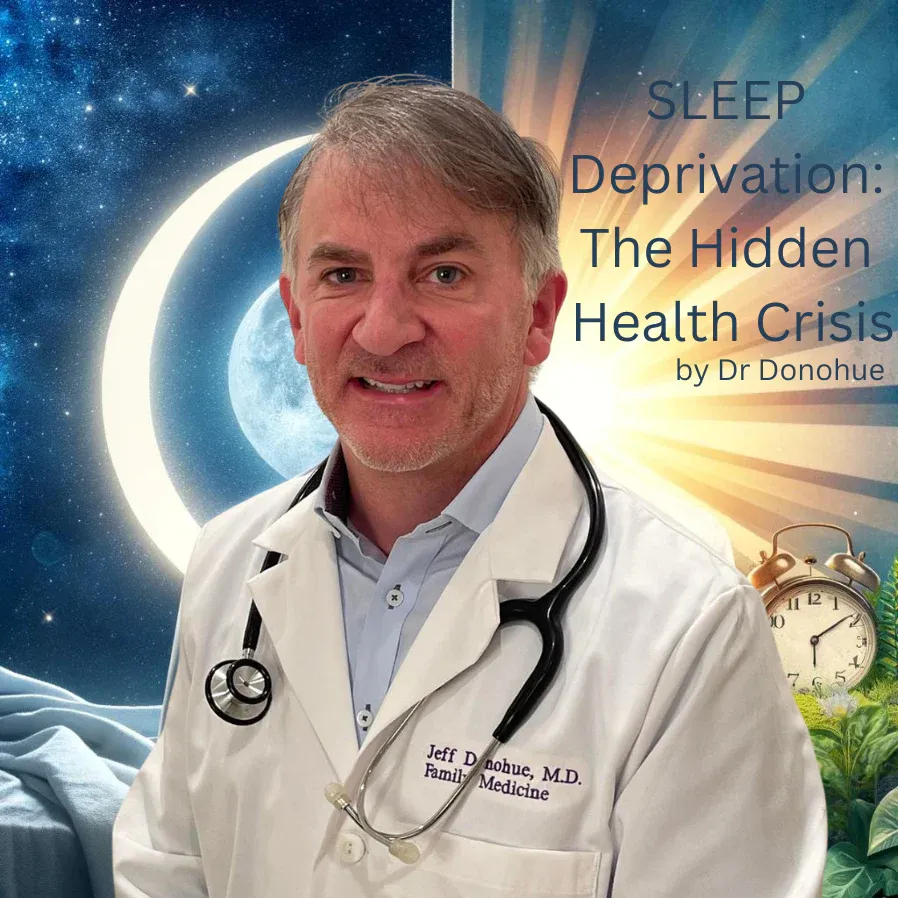Sleep Deprivation: The Hidden Health Crisis

Hey there! It's Dr. Jeff Donohue here, and today I want to chat with you about something that's becoming a big health issue for so many of us: sleep deprivation. We all lead such busy lives, and it can be easy to forget just how important a good night's sleep really is. But trust me, it's crucial for both your physical and mental health.
The Widespread Issue of Sleep Deprivation
You know that feeling when you haven't gotten enough sleep? Maybe you're groggy, a little irritable, or just can't focus? Well, sleep deprivation—getting less than the 7-9 hours of sleep we need each night—is happening more and more. Things like stress, work demands, and even our love of screens are making it harder to get the rest we need. And it's not just about feeling tired; chronic sleep deprivation can mess with your brain, your body, and your mood.
The Impact on Health
Let’s break down what lack of sleep can do:
- Cognitive Impairment: Ever find yourself unable to concentrate or forgetting things more easily? That's your brain on no sleep.
- Emotional Instability: We all get a bit cranky when we're tired, but chronic lack of sleep can really mess with your mood and make you more prone to stress.
- Physical Health Risks: Missing out on sleep regularly can lead to serious issues like heart disease, stroke, diabetes, and even obesity. Plus, it weakens your immune system, so you're more likely to get sick.
- Mental Health Disorders: There's a strong link between not sleeping enough and developing conditions like anxiety and depression.
Strategies for Improving Sleep Hygiene
So, what can you do to get better sleep? Here are a few tips:
- Establish a Routine: Try to go to bed and wake up at the same time every day. Yes, even on weekends! Your body loves a regular schedule.
- Create a Sleep-Conducive Environment: Make sure your bedroom is dark, quiet, and cool. And invest in a good mattress and pillows—they make a huge difference.
- Limit Screen Time: Put away those screens at least an hour before bed. The blue light from phones and computers can mess with your melatonin, the hormone that helps you sleep.
- Mind Your Diet: Avoid heavy meals, caffeine, and alcohol close to bedtime. They can interfere with your ability to fall and stay asleep.
- Relax Before Bed: Find a calming activity before bed, like reading, meditating, or taking a warm bath. It helps signal to your body that it's time to wind down.
Balancing the Endocannabinoid System (ECS)
Now, let's talk a bit about the Endocannabinoid System, or ECS. It's a part of your body that helps regulate many functions, including sleep. When it's out of balance, it can lead to sleep problems and other health issues.
I've seen that cannabinoids—like those found in CBD—can help regulate the ECS and improve sleep quality. They interact with ECS receptors to promote relaxation, reduce anxiety, and help you get into a better sleep-wake cycle. If you're interested in natural solutions, I recommend checking out KokuaVida.com for some great doctor-formulated CBD products that can help support your ECS and promote restful sleep.
Conclusion
Sleep deprivation is a serious health issue, but by understanding how important sleep is and taking steps to improve your sleep hygiene, you can make a big difference. As someone who specializes in Clinical Endocannabinoid Deficiency (CECD), I believe that a balanced body is the key to a restful night's sleep and better health overall.
If you're struggling with sleep, don't hesitate to reach out to a healthcare professional. They can help you find personalized strategies to get your sleep back on track and improve your quality of life.
Take care and sleep well!



